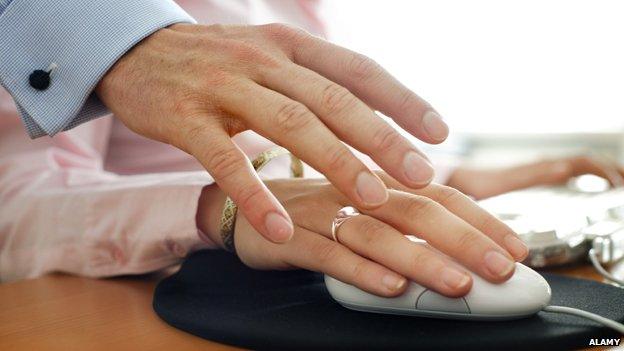Should you ask someone's permission to kiss them?
- Published
- comments

Over recent months, there's been a string of headlines about "inappropriate" sexual behaviour and when it tips over into being unlawful. Where are the lines of consent, asks Jo Fidgen.
Should you ask someone's permission to kiss them?
To many it seems the rules around relationships are changing, and the consequences of getting things wrong can be serious.
At the trial of Conservative MP Nigel Evans earlier this year, the court was told that he had tried to kiss someone, been rebuffed, and had backed off. This was regarded by the Crown Prosecution Service as potentially criminal. Evans was acquitted.
But the case prompted the question of where we draw the line between a clumsy pass and a sexual offence.
The politics of kissing has been on the mind of 29-year-old Evening Standard journalist Rosamund Urwin, who regularly writes about gender relations.
"I've been talking about this with friends recently and whether people should say, 'Is it okay if I kiss you now?' and actually I think it's really sweet because what you're saying is, 'I don't want to do something that would upset you'."
Some might see that approach as old-fashioned, but harking back to previous values may tackle modern dilemmas over consent. "We might have got to the point where it's come back in, that people want to check that somebody's OK with that because it's a move into your personal space," says Urwin. "But lots of people would disagree with me on that."
A group of young City workers, having a drink after work, gave their view. None of them wanted to give their names, but one admitted he had asked for permission to kiss a woman - though he would not recommend it.
"You think it's cool at the time because you're (a) drunk and (b) saw it in a film some time, probably a Disney film. But it's a terrible idea. You should just wade in. If you're wrong you're wrong, and you should apologise and that's the end of it. There shouldn't be any red tape that surrounds the first kiss."
His friend agreed. "Never ask to kiss a girl, just do it. "Your first kiss should arise out of the situation because you both want it. It's something you feel, not something you sign a contract on."
The debate about consent and how it should be established is raging on both sides of the Atlantic. Just this week in California, a law is being debated that will bring in new rules on university campuses to make it clear that both parties to a sexual encounter must give "affirmative consent".
The bill says, external there must be "an affirmative, unambiguous, and conscious decision by each participant to engage in mutually agreed-upon sexual activity". It goes on to say: "Lack of protest or resistance does not mean consent, nor does silence mean consent."

"The Stolen Kiss", Jean-Honore Fragonard
It's generated intense debate on news sites and blogs. Some have speculated that written permission might be needed before sex. Others have referred to the 1993 controversy over "ask first" policies initiated at Antioch College, external which asked for consent that was "(a) verbal, (b) mutual, and (c) reiterated for every new level of sexual behaviour". Antioch's much-discussed policy gave a hypothetical: "Yes, I want to kiss you also."
Some commentators have come out strongly in favour of "affirmative consent, external", suggesting that absolute clarity, external is the only way to tackle the problems among young adults on campuses.
So what is the best way of regulating this most personal area of our lives?
There are already social rules, which can be hard to pin down and which are usually enforced through peer pressure. Unwanted sexual touching - which could include kissing - is potentially criminal under the Sexual Offences Act 2003. Behaviour in the workplace is also regulated by the Equality Act 2010.
It describes sexual harassment as "unwanted conduct of a sexual nature", which "has the purpose or effect of… creating an intimidating, hostile, degrading, humiliating or offensive environment".
Note that "purpose or effect". You do not have to set out to harass someone to be guilty of doing so. Sexual harassment is a civil matter, not a criminal one, so you can be liable regardless of your intention.
Consider this scenario from employment lawyer Kiran Daurka of solicitors Slater and Gordon. "A woman could be sitting at her desk and two male colleagues could be laughing over a sexist joke or looking at something of a sexual nature. They think it's funny. They're not targeting it at the woman.
"If she feels that it's creating an intimidating or hostile environment, she potentially could bring a harassment claim." Daurka says it is no defence to call it banter.

Office banter: A potential sexual harassment scenario?
"If banter is offensive, if it's degrading, if it's creating a humiliating environment, that's harassment."
But can people agree on what counts as "humiliating" or "degrading" or any other of the terms set out in the Equality Act?
"I don't think we are at a consensus at this time," says Daurka. "What is intimidating or hostile or degrading now certainly wasn't maybe 30 years ago. "Those words need to be part of a discussion. Really it's for us as a society to decide whether something is acceptable or appropriate."
Just as with the social sphere, there is room for interpretation, and that room is where problems lie.
"The rules about sexual harassment are unworkable, pointless," says Catherine Hakim, a professorial research fellow at Civitas, a think-tank interested in limited government and personal freedom. "Law is far too crude to be used to regulate social interaction in any society."
Hakim thinks in some cultures, such as the British, people are too prudish. "The puritan, Anglo-Saxon, northern European inability to deal with anything sexual colours attitudes to everything, including flirtation in the workplace. What would be regarded as a compliment or a seduction routine in the continent, in northern Europe is more likely to be labelled sexual harassment."

Sociology Professor Frank Furedi agrees that people should trust their own judgment rather than be guided by regulations. "Once rules become the standard by which we judge what is right and what is wrong, then we lose the capacity and the maturity to deal with what are always complicated problems."
He grew up during the sexual revolution of the 1960s and thinks the younger generation is more conservative. "Sexual morality has become much more puritanical and much more regulated. I often watch my son, who's now 18, and his generation, and it really does remind me of that 19th Century, Jane Austen hesitancy that I find very alien to my own socialisation. We're going to lead to a world that becomes much more micromanaged."
Urwin is not concerned by that. "There's a reason people love Jane Austen novels," she says. Any of her characters would never dream of lunging in for a kiss without establishing with a high degree of certainty that it would be welcomed.
Give such old-fashioned manners a modern slant, with our emphasis on consent, and Urwin thinks they could help us navigate the tricky terrain of relationships.
"We think of manners as being about using the correct knife or whatever, but it isn't. It's about learning to read other human beings. So yes, I do think they could help with a lot of our problems."
They say manners maketh man. Maybe they could also help keep people out of court.
Analysis: Courting Trouble is broadcast on Radio 4 at 20:30 BST on Monday 16 June and 21:30 BST on Sunday 22 June
Subscribe to the BBC News Magazine's email newsletter to get articles sent to your inbox.